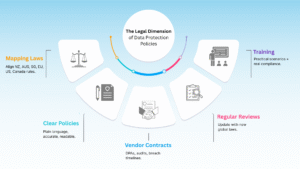
Walk into any firm today, whether in the US or the UK, and you’ll hear the same concern whispered across boardrooms: “Are we really covered when it comes to data protection?”
And no wonder. From GDPR fines in Europe running into millions, to class action lawsuits in the US after data breaches, to regulators in Singapore and Australia increasing audits, the risk isn’t just technical. It’s deeply legal.
That’s why strong data protection policies need more than IT firewalls and passwords. They need legal support teams in the mix, teams who understand laws, contracts, cross-border transfers, and regulatory language. IT protects the system. Legal ensures the policy survives scrutiny in court, in an audit, or under a regulator’s eye.
And here’s the kicker: most firms think their policies are good enough until they face their first real test.
Why IT Alone Isn’t Enough
Here’s a reality that matters:
- Only 33% of businesses actually have a concrete plan for GDPR compliance, and a whopping 39% are unfamiliar with GDPR at all, even years after it took effect. That’s not a tech issue; it’s a legal clarity issue. (Source)
- In the EU, 90% of compliance professionals say GDPR compliance is the single toughest regulatory challenge they face. (Source)
They’re not talking about firewall settings or encryption algorithms; they’re talking about the capacity to understand, interpret, and weave the legal obligation into policy; and that’s where the gap is.
When IT teams write data protection policy independent of the Law Department, they are focused on jargon-heavy operations: “encryption at rest, granular access control, password rotation cycles.” Sure, these are critical, but they are also usually missing the legal intersection:
- Which jurisdiction’s law governs if a client’s data moves from Auckland to Singapore?
- What happens if a third-party vendor misses a mandatory breach reporting deadline?
Those are questions only legal support teams can answer, transforming policy from a tech-only doc into a truly legally robust framework capable of standing up to audits, regulatory scrutiny, or contractual disputes.
The Legal Dimension of Data Protection Policies
So what does a legal team actually add? Let’s look at the key ways legal support teams strengthen data protection policies for firms.

1. Mapping Laws Across Borders
If your clients operate across NZ, AUS, SG, the EU, or North America, you know the headache: each jurisdiction has its own flavor of privacy law.
- NZ Privacy Act – focuses on data minimization and local disclosure.
- Australia’s Privacy Act – includes mandatory data breach reporting.
- Singapore PDPA – sets rules for consent and notification timelines.
- EU GDPR – strictest of all, with heavy fines and data subject rights.
- US patchwork laws – CCPA, CPRA, Colorado Privacy Act, and more.
- Canada’s PIPEDA – purpose limitation, consent rules, and accuracy standards.
IT can’t interpret this maze. But legal support teams can map obligations, highlight overlaps, and build a policy that protects a firm globally. That avoids the trap of “one-size-fits-all” templates that fail under audit.
2. Writing Policies People Actually Read
Let’s be honest: most data protection policies are unreadable. Packed with jargon, they look good in a binder but do nothing in practice.
Legal support teams fix that. They:
- Translate legal duties into plain language that staff can follow.
- Balance legal accuracy with readability (vital for training).
- Remove contradictions between IT procedures and client-facing promises.
This matters because regulators now look at not just the policy but how it’s communicated. A policy that’s clear, plain, and understood is stronger evidence of compliance than one buried in legalese.
3. Contracts and Third Parties
Data isn’t locked in one office anymore. Firms use cloud storage, payroll vendors, eDiscovery platforms, and outsourced accountants, all of which handle client data.
A breach often happens at these third parties. And if contracts aren’t solid, the firm is still liable.
Legal support teams make sure policies include:
- Data Processing Agreements (DPAs) that mirror GDPR or PDPA rules.
- Vendor due diligence requirements—checking how vendors handle data.
- Breach notification timelines—72 hours under GDPR, “expeditious” under NZ.
- Audit rights—so the firm can check vendor compliance.
This prevents the nightmare scenario where IT secures the servers but a vendor mishandles personal data, and the firm gets the fine.
4. Policy Review and Audit Cycle
Another trap? Companies see data protection policies as static documents. Draft it once, then never update it.
But regulations evolve constantly:
- EU updates on AI and data use.
- New US state privacy laws every year.
- Singapore is raising breach penalties.
Legal support teams set a policy review schedule, quarterly or annually, plus a monitoring process for global law changes. That way, policies stay living, not dead documents.
5. Training and Enforcement
Finally, a policy is only as good as its adoption. A legal team makes sure training isn’t boring slides, it’s practical scenarios:
- “What if a staff member emails client files to the wrong recipient?”
- “What if a partner wants to store client data in a personal Dropbox?”
Policies then move from “words on paper“ to behavioral change across the firm.
Also read: How to Protect Your Data from a Breach: 10 Advanced Strategies
Why Firms You Support Need This
Remember: you’re not drafting policies for end-clients, you’re supporting firms that serve those clients. When you provide legal support teams to strengthen data protection policies, those firms:
- Win client trust – by showing compliance across jurisdictions.
- Avoid penalties – by closing legal loopholes before they’re tested.
- Streamline operations – clear, readable policies reduce staff errors.
- Stay agile – with built-in reviews and cross-border mapping.
In short, you help them move from reactive (scrambling after a breach) to proactive (confident, audit-ready, client-trusted).
Wrapping Up
Strong data protection policies are no longer optional. They’re a survival tool in a global market where regulators, clients, and competitors all watch closely.
IT alone can’t cover it. By adding legal support teams, firms create policies that are technically sound, legally precise, globally compliant, and human-friendly.
And for you, the provider supporting those firms, that’s the real differentiator. Not just a firewall or a clause, but a framework where law and tech meet.
That’s how firms worldwide can walk into their next audit, or their next client meeting, without fear. Because their data protection policies aren’t just checked, they’re truly strong.

